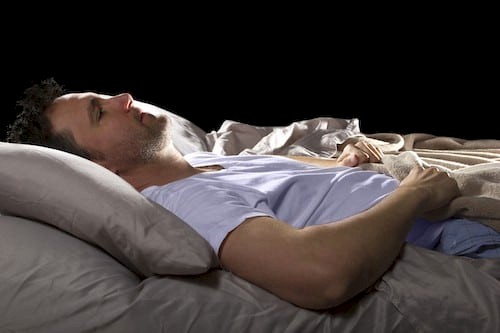Sleep Apnea – How We Can Help
 Obstructive sleep apnea is a condition that occurs when physical obstructions block your airway as you sleep. If you suffer from this condition, you also may suffer from daytime fatigue or frequent waking during the night. You may have complaints from your sleeping partner about your snoring.
Obstructive sleep apnea is a condition that occurs when physical obstructions block your airway as you sleep. If you suffer from this condition, you also may suffer from daytime fatigue or frequent waking during the night. You may have complaints from your sleeping partner about your snoring.
Sleep Apnea Treatment in Tempe
Over time, the lack of sleep can cause you to develop health issues such as high blood pressure, diabetes and an increased risk of death. For this reason, it is critical to find a treatment that helps open your airways so that you get the proper amount of oxygen as you sleep.
How Sleep Apnea is Detected During a Dental Exam
Your dentist may be one of the first people to suspect that you have sleep apnea. This is because some structural abnormalities that block your airway, such as an oversized tongue, are easily noted during a visual exam at your dental office. Dentists may also note changes in your oral health that occur from this condition such as worn-down teeth caused by tooth grinding.
Oral Health Issues That Arise from Sleep Apnea
When you have sleep apnea, you may grind your teeth or clench your jaw in response to the stress that occurs when you cannot breathe properly. Over time, this can cause small fractures to occur in your teeth that leave you more vulnerable to decay. Mouth breathing is another side effect of sleep apnea that can dry out the soft tissues in your oral cavity. If you wake up feeling parched, then your mouth may lack enough saliva to wash away the bacteria that also contributes to decay.
Steps to Take to Get a Diagnosis
When your dentist suspects that you have sleep apnea, he or she may recommend you seek a professional medical diagnosis. To do so, you will typically undergo a sleep study that tracks your physiological data overnight. Once you have a diagnosis, your dentist can then work with your medical team to identify potential treatments that help you breathe properly as you sleep.
Types of Treatment We Can Provide
For severe conditions, continuous positive airway pressure (CPAP) therapy is the most commonly recommended treatment. However, some people do not need this level of treatment or are unable to wear the mask comfortably. Dental sleep apnea treatments are a less invasive option compared to surgery that you may find effective for treating this disorder. Mandibular advancement devices (MADs) resemble a mouth guard since they fit over your teeth. However, we can adjust these devices to help position your jaw and tongue in the proper position as you sleep so that your airway remains open.
A similar device can also be used to hold your tongue in the correct position if your jaw cannot be moved forward due to other conditions. Keep in mind that these devices are not the same as mouth guards that you wear for sports or can find over the counter. For sleep apnea treatments to be effective, the oral appliance must be carefully adjusted to fit your specific needs for jaw and tongue positioning.
This condition can have detrimental effects on your health. Let your dentist know if you experience any of the symptoms of sleep apnea or have been recently diagnosed so that you can explore all your options for getting a good night’s rest.
Noble Dental Care is accepting new patients and would love to be your Tempe dentist. Call our office today for an appointment. We look forward to meeting you!